An Alternative to Alloy Wheel Refurbishment?
Jan 29, 2021
If you're an enthusiast driver and really take pride in your car then you'll likely have a slick set of shiny alloys wheels.
As well as offering distinct performance advantages over steel wheels, alloy’s can also make or break a car’s image.
However, it’s a fact of life that they are far less durable, and are particularly susceptible to impact damage from flying road debris and kerbing. Once damaged, it is not long before corrosion also sets in, making your rims look tatty and further compromising their structural integrity.
Compared to traditional steel wheels, the manufacturing process for alloy wheels is complex. This means that alloy wheels tend to cost a lot more to buy, and can easily retail at over £1000 per corner for OEM replacements.
This is why drivers have traditionally chosen to refurbish damaged alloy wheels, and in this article, we’re going to look at both the pros and cons of such repairs - and also talk about an increasingly popular alternative solution...

Alloy Wheel Refurbishment Pros
You only have to look on the forums to see that choosing the right repairer can be a bit of a minefield, with seemingly lots of ‘rogue trader’ type operators giving refurbishment a bad name. However, do your research and you’ll find that there are specialists out there with the right equipment and expertise to do the job properly.
Go with the experts and the benefits can include:
Cost savings: Costs for refurbishment varies depending on wheel treatment, the type and extent of damage, and the size and type of your wheels. However as a rough guide, a fairly typical repair may run at around £75 - £100 per wheel - still much cheaper than buying a brand new set of alloys, even aftermarket replacements.
Looks: Refurbishing your alloys will often restore them to their former glory, enhancing your car's appearance and aesthetics.
Customisation: Compared to buying new replacement wheels, refurbishment often gives you more options on custom colours and finishes. This allows you to achieve an individual look by complementing or contrasting your paintwork.
Added value: Refurbishing damaged alloys can often restore the value of your car. A big advantage if you’re looking to sell it on, or avoid costly penalty charges if handing back to a leasing company.

Alloy Wheel Refurbishment Cons
Let's now take a look at some of the drawbacks of getting your alloys refurbished:
Durability: The most reputable wheel refurbishers will give you a 12 month warranty at best. However, we have seen Diamond Cut & Lacquer finish wheels begin to fail within just three months - especially during winter.
Protection: Because refurbishment is a cosmetic treatment, the process offers no additional protection against future damage. If the damage you are having repaired is your own doing (as in the case of kerbing for example) then refurbing will be money down the drain if you continue to brush against pavements!
Matching: Even the professionals sometimes struggle to achieve the desired finish. Matching is especially difficult when refurbishing less than a full set and it's sometimes possible to spot the wheels which have been done.
Customisation: Yes, this was referenced as being an advantage too! However, just bear in mind that on the flipside you may need to pay to switch back to the original look and finish to make the car saleable or to return to a leasing company at the end of term.
Limitations: Refurbishing has its limits. Sometimes a refurb cannot be performed at all and other times, even if it can, it won't bring the wheel back to its original appearance.
Aftercare: Following treatment, wheel refurbishers often recommend you avoid specialist alloy wheel cleaning products and that instead you simply use hot soapy water and non-abrasive cloths. This is fine when your wheels are only lightly soiled, however when you are pushed for time and they are caked in road salt, muck and grime, you may well miss being able to reach for more powerful cleaning products.
Destruction: Diamond cutting is a destructive process which actually removes material from your wheel. Whilst this is usually not a problem, it means that the process cannot be repeated too many times - which is unfortunately often required over time as and when corrosion returns. Additionally, diamond cutting often leaves unsightly ‘mapping lines’ which are clearly visible on the wheel face.
Downtime: Although faster and more convenient mobile services do exist, they are usually limited to lighter ‘flat and repaint’ cover up jobs. Proper refurbishment is a workshop process, and whilst different treatments take differing time to complete, remember that your vehicle will be off the road and out of action for a period of time.

The Best Alternative to Alloy Wheel Refurbishment? You decide...
Okay, so now we’ve weighed up the various pros and cons of alloy wheel refurbishment, let’s take a look at the alternative. Whilst originally designed to prevent damage, an increasing number of enthusiasts are using Rimblade wheel protectors to both cover existing damage and protect from further future damage.
So, let's drill down and discover why fitting a set of ‘Blades is proving such a popular alternative to alloy wheel refurbishment..
Cost: Whilst refurbishment is far less expensive than buying a new set of alloys, fitting a set of wheel rim protectors is even more affordable. A set of Rimblade Ultra's, for example, currently retail at just £40 - a fraction of the cost of the average 4 wheel refurbishment which could easily be up to 10 times more expensive.
Protection: Unlike refurbishment which offers zero additional or future wheel protection, Rimblades will cover existing damage and help protect against a host of different types of damage recurring.
Durability: Rimblades are designed to be a ‘sacrificial upgrade’ - meaning that the ‘Blade saves your wheel by absorbing the damage. At that point they can be very easily (and cost effectively) removed and replaced. However, compared to the lifespan of a refurbished wheel, the core Santoprene TPV material used will withstand very extreme weather and road conditions without degrading at all. They will also withstand specialist wheel cleaning products, brushing and jet washing.
Non-destructive: Unlike certain refurbishment processes, Rimblades do not affect the structural integrity or surface finish of your alloy in any way whatsoever.
DIY Installation and Removal: Rimblades are a true DIY product which can be fitted and removed at home on your drive in around 5 to 10 minutes per wheel. No dealing with the workshop, no shuttling your car back and forth, no downtime off the road.
Preserve value and protect against damage penalties: Because wheel protectors are viewed as a performance upgrade that enhances the vehicle, most drivers choose to leave them fitted when either selling or returning to the lease company.

Get the edge.
If you’ve been considering refurbing your alloy wheels but are wary of some or all of the drawbacks and pitfalls we have touched on in this article then maybe it’s time for you to get the edge with Rimblades.
Launched recently, we have a brand new range consisting three core products - Light, Ultra and Pro, with each providing varying levels of protection and product weight to suit your precise needs and driving style.
If you are new to the Rimblade brand, please remember:
- 'Blades can simply be bonded onto your car without having to modify it in any way, covering existing damage, and providing instant enhanced looks AND protection.
- Our alloy wheel rim protectors are designed as a sacrificial performance upgrade, meaning you can quickly and easily switch out a damaged ‘Blade whenever you feel like it.
- The 3M VHB tape that we use creates an incredibly strong, durable and consistent bond. Additionally, we insist on using premium Santoprene TPV which delivers reduced weight, increased durability, and most importantly for our products – superior, consistent performance.
- Rimblades are manufactured wholly in the UK utilising the most advanced materials on the market. Our products have been fully tested by Millbrook for high-speed endurance, various road surfaces and kerb strikes at various angles. We've also passed car manufacturers OE testing and the bonding tape has been lab-tested by technology giant 3M.
- Rimblades are NOT comparable to universal ‘cut and join’ type tyre-trap protectors. Tyre-trap protectors use a very different fitting method and are typically jointed which has led to concerns over the bead area (where they trap between tyre and rim) becoming compromised. Whilst Rimblades are jointed, they bond to the wheel and do not interface with the bead area at all.
*Please note that whilst the 3M VHB technology we use creates an incredibly strong bond, that more severe types of alloy damage may not be suitable for covering with Rimblades depending on the exact condition of the surface interfaced by the ‘Blade itself.
GET THE EDGE FOR LESS - 20% OFF AT CHECKOUT:
Whilst time spent actually driving during lockdown may be limited, there is nothing stopping you upgrading your pride and joy, ready for when the restrictions are eased.
Super fast and easy to install at home, Rimblades are already one of the best ‘bang for your buck’ DIY accessory upgrades you can make. And to make upgrading even easier during lockdown, we are currently offering a full 20% discount.






